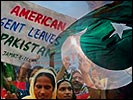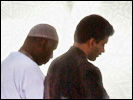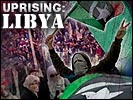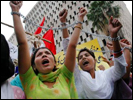 Defying GOP and Eying Re-Election, Obama Makes Bold …
Defying GOP and Eying Re-Election, Obama Makes Bold …
The Republican caucuses in Iowa show the 2012 presidential election promises to be long, contentious, extremely expensive and perhaps more negative than any in history.
The New York Times reports how, on Dec. 17, "a linebacker-size officer grabbed the collar of Mr. Devereaux, who wore an ID identifying him as a reporter. The cop jammed a fist into his throat, turning Mr. Devereaux into a de facto battering ram to push back protesters."
Click here to read the article.
The once-imprisoned U.S. activist Lori Berenson will be allowed to travel to New York City from Peru to spend the holidays with her toddler son for the first time since her arrest in 1995. Click here to listen to Amy Goodman’s exclusive interview in 1999 with Berenson in the Socabaya Prison.
Start 2012 off right with a contribution to Democracy Now!
Topics

Democracy Now! has closely followed the U.S.-led attacks and occupation of Iraq over the years.
-

Scott Olsen, U.S. Vet Wounded at Occupy Oakland, on Recovery, Protests, Iraq and Bradley Manning
December 30, 2011 | StoryFor our last broadcast of 2011, we turn to someone who became one the faces of the global Occupy movement this year. Scott Olsen, a 24-year-old former U.S. Marine who served two tours in the Iraq War, was critically wounded after being shot in the head by a police projectile at Occupy Oakland. In a rare interview, Olsen joins us to discuss his life-threatening ordeal, his involvement in this year’s historic Wisconsin and Occupy protests, the case of accused Army whistleblower Bradley Manning and how he too had access to similar types of information, and the U.S. withdrawal from Iraq. "They aren’t respecting our right to assemble, protest and redress our government for grievances," Olsen says of police repression of the Occupy protests. "They are terrorizing us from going out [to demonstrations]. That is a sad statement for our country." Olsen also says he expects to rejoin the Occupy and antiwar protests as his recovery progresses. "I look forward to being a part of the 99 percent and Iraq Veterans Against the War in 2012," he says. [includes rush transcript]
-

In Exiting Iraq, U.S. Military Discards Trove of Found Documents on 2005 Haditha Massacre of Iraqis
December 21, 2011 | StoryAs the U.S. military leaves Iraq, the New York Times has recovered hundreds of pages of documents detailing internal interrogations of U.S. Marines over the 2005 Haditha massacre of Iraqi civilians. The documents, many marked "secret," were found among scores of other classified material at a junkyard outside Baghdad as an attendant used them as fuel to cook his dinner. The documents reveal testimony of Marines describing killing civilians on a regular basis. "In some ways, this is one of the most grotesque episodes of the entire war in Iraq. And I’m afraid to say, this is part of our legacy," says Time magazine contributor Tim McGirk, who first broke the story of Haditha in 2006. It was November 19, 2005, when a U.S. military convoy of four vehicles driving through Haditha was hit by a roadside bomb, killing Lance Corporal Miguel Terrazas. The next night, Marines burst into several homes in the neighborhood, killing 24 Iraqis, including a 76-year-old man and women and children who were still in their night clothes when they died. "Nobody is behind bars for this," McGirk notes. Charges from the episode were dropped against six of the accused Marines, one was acquitted, and the final case is set to go to trial next year. [includes rush transcript]
-

U.S. Withdrawal from Iraq: "In Terms of Destroying Iraq, It’s 'Mission Accomplished'"
December 16, 2011 | StoryThe U.S. military may be leaving Iraq, but the U.S. government is not. The U.S. embassy in Baghdad is the largest in the world, and thousands of private contractors will fill the role of the departing U.S. troops. We begin our coverage of the U.S. withdrawal with Sami Rasouli, the founder and director of the Muslim Peacemaker Teams in Iraq, who joins us from the city of Najaf. Invoking George W. Bush’s infamous declaration after the fall of Baghdad, Rasouli says, "In terms of destroying Iraq, it’s really 'mission accomplished.'" [includes rush transcript]
-

The Costs of War: Tens of Thousands Dead, Billions Spent, and a Country Torn Apart
December 16, 2011 | StoryOver the past nine years, the U.S. invasion and occupation has left a bloody toll on Iraqi civilians and foreign troops. Nearly 4,500 U.S. troops died, and another 32,000 were wounded. An accurate toll of Iraqis killed may never be known. Iraq Body Count says at least 104,000 Iraqi civilians have died, while some studies put have put the death toll at over one million. We speak to Catherine Lutz, Brown University professor and co-director of the "Costs of War" research project at the Watson Institute for International Studies. "The costs have really been staggering," Lutz says. "We know that Congress appropriated $800 billion over the years for the Iraq War. But the true costs, of course, go much farther than that, starting with the people of Iraq, who have lost lives in the hundreds of thousands." [includes rush transcript]
-

Iraqi Women’s Activist Rebuffs U.S. Claims of a Freer Iraq: "This Is Not a Democratic Country"
December 16, 2011 | StoryYanar Mohammed, president of the Organization of Women’s Freedom in Iraq, joins us to discuss the impact of the nearly nine-year U.S. occupation, particularly on Iraqi women. "The Iraqi cities are now much more destroyed than they were, I would say, like five years ago," Mohammed says. "In the same time, we have turned to a society of 99 percent poor and 1 percent rich, due to the policies that were imposed in Iraq." Mohammed decries the repression of Iraqi protesters that joined the Arab Spring in a February 25th action. "The women are the biggest loser in all of this. We went to the Iraqi squares. We demonstrated. The Arab Spring was there very strongly but got oppressed in ways that were new to Iraqi people. Anti-riot police of the American style was something that we witnessed there... This is not a democratic country." [includes rush transcript]
-

House-Senate Revise Indefinite Detention Bill in Bid to Avoid White House Veto, But Fears Remain
December 14, 2011 | StoryThe House is expected to vote today on a massive $662 billion defense bill that could usher in a radical expansion of indefinite detention under the U.S. government. A provision in the National Defense Authorization Act would authorize the military to jail anyone it considers a terrorism suspect anywhere in the world without charge or trial. The measure would effectively extend the definition of what is considered the U.S. military’s battlefield to anywhere in the world, even the United States. The White House has issued a veto threat with backing from top officials, including Defense Secretary Leon Panetta, Director of National Intelligence James Clapper, and FBI Director Robert Mueller. Lawmakers are hoping several last-minute revisions will address the concerns and eliminate the veto threat, but critics warn the bill poses a major threat to basic constitutional rights. We speak to Chris Anders, the senior legislative counsel in the American Civil Liberties Union’s Washington Legislative Office. "This is putting people in prison, potentially for the rest of their lives, based on nothing more than suspicion," Anders warns. [includes rush transcript]
-

Ex-Salt Lake Mayor Rocky Anderson, Former Democrat, Launches Third Party Presidential Bid Against Obama, GOP
December 13, 2011 | StoryA new political party has entered the fray as an alternative to Democrats and Republicans ahead of the 2012 elections. On Monday, former Salt Lake City Mayor Rocky Anderson announced he will run for president with the newly formed Justice Party. Although hailing from a solidly red state, Anderson has been known as one of the most progressive mayors of any major U.S. city in recent years. During his two mayoral terms from 2000 to 2008, Anderson was an outspoken champion of LGBT rights, environmental sustainability, and the antiwar movement in opposition to the Iraq War. Vowing to fight the influence of money over politics, Anderson kicked off his campaign on Monday with a pledge to limit individual donations to $100 a person. Anderson and the Justice Party say they hope to build a grassroots movement heading into the November 2012 elections. "We launched the Justice Party because the entire system is so corrupt," Anderson says. "It’s so diseased. We know that the public interest is not being served by anyone in the system right now, particularly the two dominant parties who have sustained this corrupt system and who are sustained by it." [includes rush transcript]
-

As Biden Visits Iraq Ahead of U.S. Withdrawal, Critics See Last Ditch-Effort to Preserve Occupation
November 30, 2011 | StoryU.S. Vice President Joe Biden has arrived in Iraq for an unannounced visit to mark the withdrawal of U.S. troops by the end of the year. Shi’ites supporting Iraqi cleric Moqtada al-Sadr held an anti-U.S. protest in Basra to oppose Biden’s visit. Meanwhile, the Financial Times reports that numerous investment bankers are arriving in Iraq to secure potentially lucrative reconstruction and oil deals even though security remains a concern. We’re joined by Raed Jarrar, an Iraqi-American blogger and political analyst who just returned from Iraq two weeks ago. "Biden’s visit is widely seen in Iraq as the last attempt by the U.S. government to keep U.S. troops beyond the deadline and rename them as military trainers," Jarrar says. "Most Iraqis are worried [that] the Pentagon has not let go of its plan to leave behind 3,000-4,000 troops under the title of 'trainers', and that there will be one last showdown in the Iraqi parliament within the next few days." [Includes rush transcript]
-

State Dept. Veteran Peter Van Buren Defies U.S. Censors to Recount Failed Reconstruction in Iraq
November 30, 2011 | StoryIn "We Meant Well: How I Helped Lose the Battle for the Hearts and Minds of the Iraqi People," State Department official Peter Van Buren provides a first-hand account of the faltering and often misguided attempts at reconstruction in Iraq undertaken by the U.S. government. Van Buren published the book after rebuffing heavy State Department pressure to redact a number of passages. Van Buren joins us to discuss the failed efforts he witnessed in Iraq and his struggle to tell his story to the world. "The State department is very much like the Mafia," Van Buren says. [Includes rush transcript]
-

Glenn Greenwald: Is Obama Fulfilling the Neocon Dream of Mass Regime Change in Muslim World?
November 28, 2011 | StoryPolitical blogger Glenn Greenwald recently wrote about retired General Wesley Clark’s recollection of an officer telling him in the weeks after the Sept. 11 attacks that the then U.S. Secretary of Defense had issued a memo outlining a plan for regime change within five years in Iraq, Syria, Lebanon, Libya, Somalia, Sudan and Iran. We play an excerpt of Clark’s comments and ask Greenwald to respond. “What struck me in listening to that video ... is that if you go down that list of seven countries that he said the neocons had planned to basically change the governments of, you pretty much see that that vision, despite the perception that we have a Democratic president and therefore the neo-conservative movement is powerless, is pretty much being fulfilled,” Greenwald says. [Includes rush transcript]









































